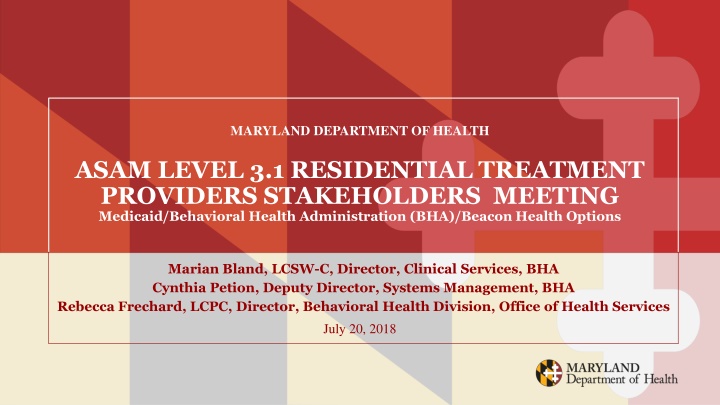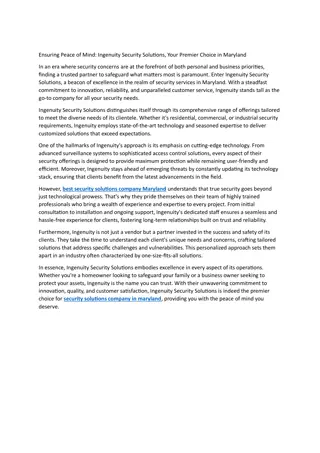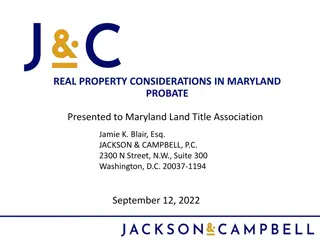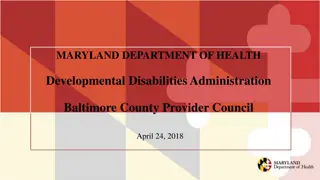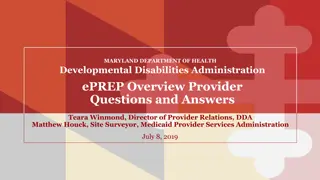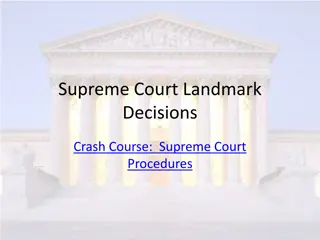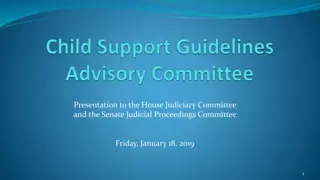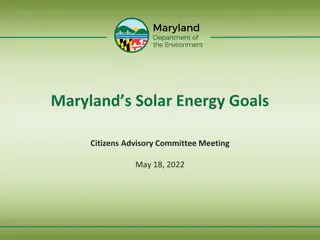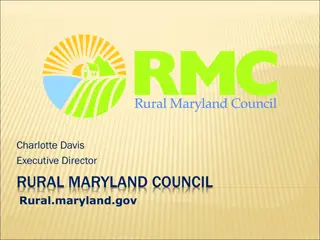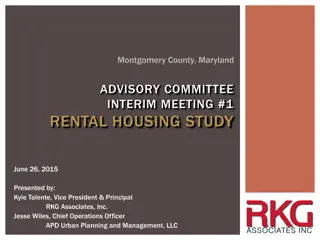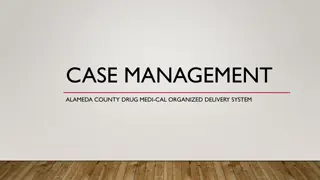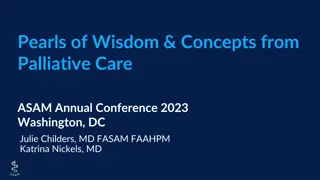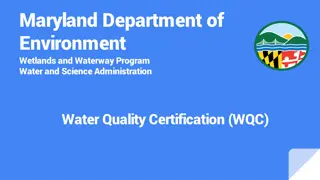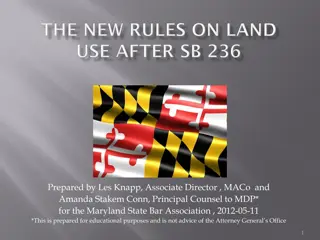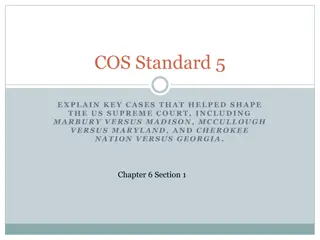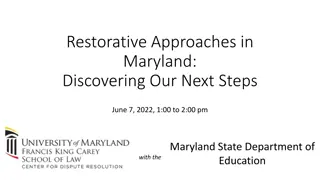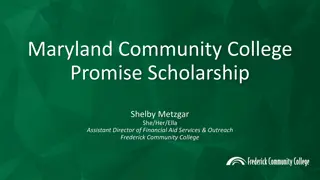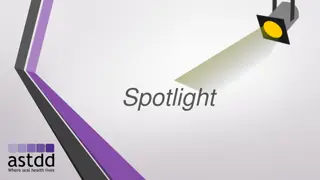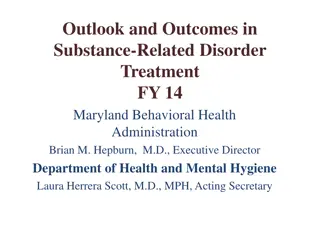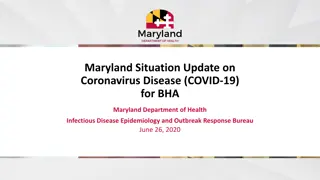Maryland Department of Health ASAM Level 3.1 Stakeholders Meeting Overview
A recap of the ASAM Level 3.1 Residential Substance Use Treatment Stakeholders Meeting discussing Medicaid coverage, accreditation requirements, and transition to fee-for-service model in Maryland. Key points include reimbursement details, service coverage, and licensing steps for providers.
Download Presentation

Please find below an Image/Link to download the presentation.
The content on the website is provided AS IS for your information and personal use only. It may not be sold, licensed, or shared on other websites without obtaining consent from the author.If you encounter any issues during the download, it is possible that the publisher has removed the file from their server.
You are allowed to download the files provided on this website for personal or commercial use, subject to the condition that they are used lawfully. All files are the property of their respective owners.
The content on the website is provided AS IS for your information and personal use only. It may not be sold, licensed, or shared on other websites without obtaining consent from the author.
E N D
Presentation Transcript
MARYLAND DEPARTMENT OF HEALTH ASAM LEVEL 3.1 RESIDENTIAL TREATMENT PROVIDERS STAKEHOLDERS MEETING Medicaid/Behavioral Health Administration (BHA)/Beacon Health Options Marian Bland, LCSW-C, Director, Clinical Services, BHA Cynthia Petion, Deputy Director, Systems Management, BHA Rebecca Frechard, LCPC, Director, Behavioral Health Division, Office of Health Services July 20, 2018
ASAM 3.1 Residential Substance Use Treatment Stakeholders Meeting Meeting Purpose To discuss the proposed regulations and rates for American Society of Addiction Medicine (ASAM) 3.1 Residential Substance Use Disorder (SUD) services To continue stakeholder discussions about transition from grants to fee-for- service on Jan. 1, 2019 2
ASAM 3.1 Residential Substance Use Treatment Stakeholders Meeting Background On July 1, 2017, Maryland Medicaid implemented reimbursement for two nonconsecutive up to 30-day stays in a rolling year for ASAM Levels 3.7WM, 3.7, 3.5, and 3.3. Services beyond the Medicaid covered days are reimbursed through state funds On Jan. 1, 2018, the Specialty ASAM Levels 3.3 and 3.5 Residential Providers were also moved to the Fee for Service (FFS) model and are being reimbursed through Medicaid and state funding 3
ASAM 3.1 Residential Substance Use Treatment Stakeholders Meeting Background The Maryland Department of Health (MDH) is now completing the final phase to include Medicaid coverage of ASAM Level 3.1beginning on Jan. 1, 2019. Services beyond Medicaid covered days will also be reimbursed through state funds for this level 4
ASAM 3.1 Residential Substance Use Treatment Stakeholders Meeting Accreditation and Licensing Three Major Steps: 1. Obtain accreditation. A listing of approved Accrediting Organizations (AOs) is available on the Behavioral Health Administration s (BHA s) website. Each organization has slightly different standards and a different cost structure, and agencies may decide which one to use. Not all of the AOs are approved to accredit all programs, so it is important to ensure that a particular agency s programs are covered. 5
ASAM 3.1 Residential Substance Use Treatment Stakeholders Meeting Accreditation and Licensing Three Major Steps: 2. Obtain a written agreement to cooperate with the Local Addiction Authority (LAA), Core Service Agency (CSA), or Local Behavioral Health Authority (LBHA) in each jurisdiction in which services will be offered. If offering both mental health and SUD services, then there must be an Agreement to Cooperate from both the CSA and LAA in jurisdictions that do not have an LBHA. The form for the Agreement to Cooperate is listed on BHA s website. 6
ASAM 3.1 Residential Substance Use Treatment Stakeholders Meeting Accreditation and Licensing Three Major Steps: 3. Submit a licensing application to BHA. The form on which to do this is on this website. The specifics of the application process are laid out in COMAR 10.63.06. To help determine whether or not a specific program requires accreditation or licensure through COMAR 10.63.06, BHA has prepared a decision tree available at https://bha.health.maryland.gov/Documents/Decision%20Tree.pdf. Questions should be addressed to bha.regulations@maryland.gov 7
ASAM 3.1 Residential Substance Use Treatment Stakeholders Meeting COMAR 10.63.06 Licensed as a residential-low intensity level 3.1 program Provide substance-related disorder treatment in large and small halfway houses, as defined in Health-General Article 8-101 Annotated Code of Maryland, to individuals who: o Meet the ASAM Criteria for level 3.1 o Are capable of self-care, but are not ready to return to family or independent living o Services shall be: Provided for a minimum of five hours per week, and directed toward preventing relapse, applying recovery skills, and reintegrating into the community 8
ASAM 3.1 Residential Substance Use Treatment Stakeholders Meeting ASAM Criteria The ASAM criteria is the most widely used and comprehensive set of guidelines for placement, continued stay, and transfer discharges of patients with addiction and co-occurring conditions. Maryland Medicaid and the state reimburses for the following levels of care based on ASAM: Level 3.1 Determined based on multi-dimensional assessment using the six dimensions Provide five hours per week of low intensity treatment Treatment characterized by individual, group and family therapy; medication management; and psychoeducation Services facilitate application of recovery skills, relapse prevention, and emotional coping strategies 9
ASAM 3.1 Residential Substance Use Treatment Stakeholders Meeting Options Considered MDH considered two options for how to move forward with reimbursing ASAM Level 3.1 providers, effective Jan. 1, 2019. As part of this stakeholder meeting, MDH sought to understand from providers which option is more viable within the current treatment landscape while focusing on quality services. 1. Reimburse for ASAM Level 3.1. 2. Continue with current reimbursement mechanism. 11
ASAM 3.1 Residential Substance Use Treatment Stakeholders Meeting Option 1: ASAM Level 3.1 Overview: Enroll ASAM level 3.1 providers as Provide Type 54s. Develop an all- inclusive daily rate for clinical/ therapeutic services associated with ASAM 3.1 level of treatment. No other services may be reimbursed concurrently with the exception of psychiatric services and the Opioid Treatment Program (OTP) weekly medication bundle. 12
ASAM 3.1 Residential Substance Use Treatment Stakeholders Meeting Option 1: ASAM Level 3.1 Consideration points: Consistent with reimbursement model for 3.3, 3.5, 3.7, and 3.7 WM Drug testing costs are included in the daily payment and therefore may not be billed separately Requires more clinical/therapeutic services and staffing than is currently being provided by some providers in this level of care No other behavioral health providers may receive reimbursement for services provided while the individual is receiving this level of care (with the exception of psychiatrists and OTPs for the weekly bundle only). Counseling may not be reimbursed separately 13
ASAM 3.1 Residential Substance Use Treatment Stakeholders Meeting Option 2: Current Mechanism Overview: Do not enroll ASAM level 3.1 providers separately. Formalize the process of 3.1 providers billing for clinical/ therapeutic services through a PT 50 with outpatient counseling codes. Medicaid/BHA would block payment for services above level 1 when individuals are receiving this level of care. BHA would support a daily rate for room and board and any other costs that may not be reimbursed by Medicaid. Providers would be required to allow participants to receive needed counseling services at a provider of their choice. 14
ASAM 3.1 Residential Substance Use Treatment Stakeholders Meeting Option 2: Current Mechanism Consideration points: Participants may receive services from other providers in the community Medicaid could reimburse for the clinical services only based on continuing Medical Necessity Criteria (MNC) Some services offered under programs is not Medicaid reimbursable and would be state only funded which can create challenges for implementation Inconsistent with the reimbursement model for 3.3, 3.5, 3.7, and 3.7 WM and is not following the 1115 Waiver proposal that gave the state authority to implement this level of care to adults 15
ASAM 3.1 Residential Substance Use Treatment Stakeholders Meeting Decision Enroll ASAM level 3.1 providers as Provide Type 54s. Develop an all-inclusive daily rate for clinical/ therapeutic services associated with ASAM 3.1 level of treatment. Consideration points: Consistent with reimbursement model for 3.3, 3.5, 3.7, and 3.7 WM Drug testing costs are included in the daily payment and therefore may not be billed separately Requires more therapeutic services and staffing than is currently being provided by some providers in this level of care 16
ASAM 3.1 Residential Substance Use Treatment Stakeholders Meeting Decision: Option 1 Please see handout highlights include: 1) Level 1 SUD treatment can co-exist with the 3.1 service (i.e. clinical services not included) therapeutic activities that promote and support recovery activities are required for at least five hours a week of programming as determined on the treatment plan performed by a provider of a license type listed under COMAR 10.09.59. 2) Lab testing is included in the bundled rate just as it is for the other levels of care. The rate includes routine testing on site as well as the cost of definitive testing per individual. 3) See handout for staffing requirements. 4) Rate: Daily Medicaid rate $85.00 + state funded room and board rate of $45.84 (specialty populations have enhanced room and board rates). 17
ASAM 3.1 Residential Substance Use Treatment Stakeholders Meeting Residential SUD Rates Authorization and reimbursement will be performed by the ASO, Beacon Health Options, for clinical services and for room and board: ASAM Level of Care Clinical Rates Per Diem Room and Board Total Reimbursement (Clinical + Room and Board) Level 3.1 $ 85.00 $45.84 $ 130.84 Level 3.1 (court ordered) $ 85.00 $60.01 $ 145.01 Room and board rates for 8-507/court involved includes transportation, monthly progress report, court attendance, submittal of off ground privileges form, and other state requirements. Clinical rate includes laboratory costs Providers are not permitted to balance bill either Medicaid or uninsured individuals for services covered by Medicaid or the state 18
ASAM 3.1 Residential Substance Use Treatment Stakeholders Meeting Regulations: Next Steps Proposed regulations will post in the Maryland Register within the next couple of weeks 30 day comment period on proposed regulations Notice of final regulations will post in the Maryland Register Regulations will be effective Jan. 1, 2019 19
ASAM 3.1 Residential Substance Use Treatment Stakeholders Meeting Authorization Process The clinical information that is reported by the provider must meet ASAM criteria for the level of care that is being requested Provide information that is clinically comprehensive, including narrative on the six ASAM dimensions to support the request, so that a medical necessity determination can be made Authorizations should be submitted electronically through ProviderConnect for routine requests Urgent determinations and authorizations may be requested by calling Beacon s Customer Service line: 800-888-1965 20
ASAM 3.1 Residential Substance Use Treatment Stakeholders Meeting Training Beacon Health Options will provide training to providers on billing the Public Behavioral Health Systems (PBHS). At minimum, a computer and internet with capacity to upload files is needed. Providers do not need sophisticated billing systems, but will need to get familiar with billing for services rendered Beacon will issue Provider Alerts with training dates beginning in the fall and continuing through Go-Live 21
ASAM 3.1 Residential Substance Use Treatment Stakeholders Meeting Resources Providers can register for Beacon Health Options, Provider Alerts at: http://maryland.beaconhealthoptions.com/provider/prv_alerts.html Other questions should be sent to Provider Relations: marylandproviderrelations@beaconhealthoptions.com Behavioral Health Unit Provider Enrollment: mdh.bhenrollment@maryland.gov Behavioral Health Unit Policy and Programs: mdh.mabehavioralhealth@maryland.gov More ASAM information: https://www.asam.org/quality-practice/guidelines-and-consensus- documents/the-asam-criteria. 22
Thanks for your participation Questions?
